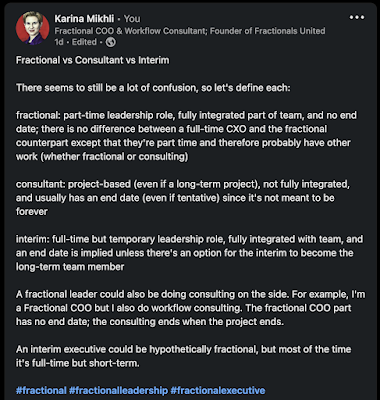Why Fractionals United (Karina Mikhli)
I was doing fractional COO work before it was called that, went full-time briefly with one of my previous fractional clients, and returned to a very different fractional market.
On the one hand, it's now popular and in the news, and there are also many more fractional leaders out there. On the other hand, my previous major source of fractional leads was no longer viable, so I had to figure out how to do this in the new paradigm.
So I went looking for a community.
I had discovered the benefits of online communities over the last several years and wanted to find one for fractionals, so that I could learn from others and perhaps collaborate with them. I found a few fractional-related organizations and programs, but not one that was a community first and foremost.
As many other founders before me, I decided to build the thing I needed. I posted the idea in several communities to see if there was interest, and when I realized there was, quickly started a free slack and within a day, a simple site.
Fast forward a month later, and we've grown quite a bit, have a volunteer leadership committee (who you will learn about in the next post), and are launching a crowdsourced blog so that it's not only my voice and perspective shared here.
For those wondering what the difference between a fractional and consultant or interim leader is, you can refer to a recent LinkedIn post (also shown below) that I hope will clarify this once and for all.
Fractionals United is a community for all current fractional professionals and those considering going this route. So if you are a fractional or wannabe fractional, join us; and if you need fractional talent, you've come to the right place. Share your needs and I'll be happy to post it to our growing, talented community.

.png)
Comments
Post a Comment